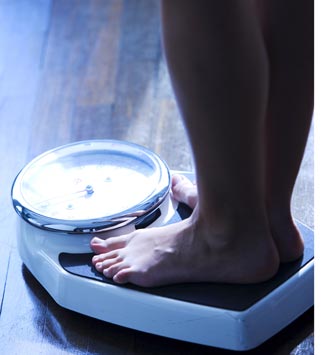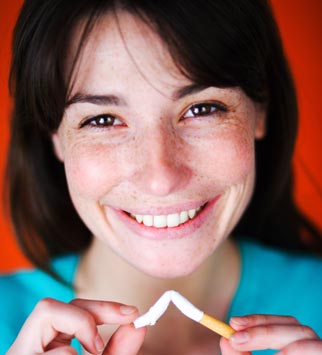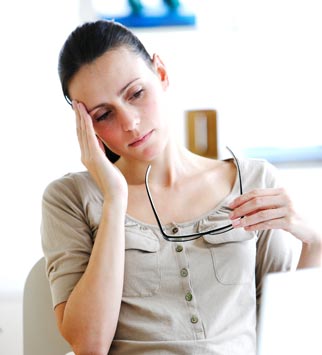The fertility fitness plan
Follow our tips on how to maximise your chances of conceiving

Follow our tips on how to maximise your chances of conceiving
A Body Mass Index (BMI) of under 19 or over 30 can impair fertility. Underweight women often have no periods because they’ve stopped ovulating, and overweight women may also have ovulation problems – sometimes caused by PCOS - making them more likely to have problems conceiving.
Forget diets, focus on health
Weigh up your numbers

According to Dr Glenville, if you’re overweight, the greater the weight, the greater the problems that might develop. If you’re underweight, aim for a BMI of 20-25, with 24 being optimal. ‘Give up dieting and opt for a healthy eating plan,’ she suggests. ‘When your weight returns to normal, wait three months before trying for a baby as you’re likely to have nutritional deficiencies following years of dieting. After six months, these should correct.’
Weigh up your numbers

According to Dr Glenville, if you’re overweight, the greater the weight, the greater the problems that might develop. If you’re underweight, aim for a BMI of 20-25, with 24 being optimal. ‘Give up dieting and opt for a healthy eating plan,’ she suggests. ‘When your weight returns to normal, wait three months before trying for a baby as you’re likely to have nutritional deficiencies following years of dieting. After six months, these should correct.’
Know your biology

For women, optimum fertility occurs at 18, says Dr Gillian Lockwood, medical
director of Midland Fertility Services and co-author of Fertility & Infertility for Dummies (£15.99, Wiley). It stays constant in your twenties, then takes a gradual downturn. By the time you are 35 that has accelerated and, by 40, the slide is dramatic.
Find out about your ovarian reserve
That’s the number of eggs your body is
capable of producing and maturing in your ovaries, which declines as you get older. Plan Ahead (£179, from Boots)
requires you to send a blood sample to a lab where hormones are analysed to
indicate your ovarian reserve. You receive results within 21 days. ‘Plan Ahead is not
a fertility test per se,’ says Professor
William Ledger, fertility specialist at
Sheffield University. ‘But it might help give a woman a picture of her own fertility instead of relying on statistics.’
Get a fertility MOT
At London’s Create Health, you can have a 3D pelvic ultrasound scan to monitor ovarian blood flow and check for abnormalities, such as endometriosis, for £200, as well as a blood test to predict egg reserve for an extra £99. Alternatively, ask your GP for
a referral to a gynaecologist who can
do similar investigations.
Find out about your close female relatives? fertility

If your mother had a very early or very late menopause, the same thing could happen to you, as researchers believe there is a genetic link.
Talk to your mum
‘If your mother had an early menopause, it’s advisable to have a full ovarian reserve test with a gynaecologist as soon as possible to get an idea of whether the same will happen to you,’ says Dr Magdy Asaad, clinical director of the London Fertility Centre. ‘If you’re not yet ready to start trying for a baby, I would recommend having the test every year or so until you are. If your periods have become lighter or more irregular, you have nothing to lose from being tested.’
Talk to relatives
‘Most common causes of infertility, such as endometriosis, fibroids and polycystic ovary syndrome (PCOS), run in families,’ says Dr Lockwood. ‘If you know your mum, sister or a “secondary” relative had any of these, tell your doctor. They might recommend taking the Pill as contraception, which could lower your risk of developing endometriosis-related infertility in the future.’
Celebrity news, beauty, fashion advice, and fascinating features, delivered straight to your inbox!
Break bad habits

If you’re serious about having a baby – ever – stop smoking. The most significant lifestyle risk factor in reducing the age of menopause is smoking. ‘If you smoked in your teens, your menopause will be three years ahead of schedule,’ says Dr Lockwood.
Cut down or quit
After you’ve given up, though the damage can’t be reversed, it won’t continue. Quitting is best, so get advice at quit.org.uk. If that’s impossible, try to cut right down. ‘If you smoke 20 a day or more, you will advance menopause by two years,’ says Professor Ledger.
Tackle gynae red flags

Endometriosis and PCOS are common causes of problems.
Talk to your doctor
Get a referral to a gynaecologist, who may prescribe medication or even surgery. If you have excruciating period pain, pain between periods, during sex or bowel movements, get tested for endometriosis or PCOS.
Change your lifestyle
Exercise and a high-nutrient, low-sugar diet will positively affect hormonal imbalances.
Change your diet

A study from the Harvard School of Public Health proved it was possible to increase your fertility fitness through diet.
Avoid trans-fats
The biggest diet factor is trans-fats. Just 4g a day (half a portion of fried chicken) can have a negative effect.
Take a multivitamin
Research has shown a good multivitamin can double your chances of getting pregnant.
Eat for fertility
Foods with a particularly strong impact are green leafy vegetables, strawberries, lentils, whole grains, almonds, sweet potatoes, avocado and seeds.
Mind the coffee
Limit your intake to two cups of coffee a day.
Find exercise equilibrium

A 2007 study published in Obstetrics & Gynaecology found that an improvement in fitness was as effective as weight reduction. ‘Regular exercise regulates hormones and your menstrual cycle by helping you reach a healthy weight and keeping stress levels down,’ says Dr Glenville. ‘But don’t overdo it. Exercising for more than 15 hours a week could inhibit ovulation and lead to a loss of periods.’
Exercise moderately
‘The optimum to help your chances of conceiving is to do half an hour of moderate
aerobic exercise – such as power-walking or swimming – five times a week,’ says Zita West, fertility expert and author of Plan to Get Pregnant (£14.99, Dorling Kindersley).
Be alcohol aware

‘Research has shown that women who drink heavily stop ovulating and menstruating and take longer to conceive,’ says Dr Glenville. ‘They often say to me, ‘I’ll stop drinking when I know I am pregnant, but the irony is that drinking too much could make it harder for them.’
One word: moderation
Stick to the government guidelines of no more than 14 units of alcohol a week, and a maximum of three in one sitting. ‘If you’re serious about getting pregnant, and are in your mid or late thirties, try to cut back to five units a week,’ says Dr Lockwood.
Check for hidden hazards

The main STIs affecting fertility are the two most common ones: gonorrhoea and chlamydia. If you’ve had either and been treated with antibiotics, you’re probably fine. However, chlamydia left untreated can cause pelvic inflammatory disease (PID), which can lead to blocked Fallopian tubes. ‘Gonorrhoea can also affect fertility by leading to blocked and scarred tubes,’ says fertility expert Dr Mann.
Get tested
It’s worth having tests with your GP or local GUM clinic. And don’t be scared of the
results, treatment is simply antibiotics. If you have had an STI in the past, ask to be referred for an ultrasound to ensure you don’t have PID.
Balance your cycle

If your periods are regular, then you’re more likely to be ovulating, which means you’re also likely to be producing the right hormones in the right amounts to get pregnant. If your periods aren’t regular, or you’ve stopped menstruating, you might have PCOS, which can prevent normal ovulation.
Get to the cause
The ‘Day 21 Progesterone Level’ test is the most accurate indicator of ovulation. ‘Stress, early menopause, a history of anorexia or bulimia as well as PCOS can cause periods to stop or become irregular,’ says Dr Mann. ‘Get a referral to a gynaecologist for treatment.’
Zone in on stress

Too much stress can trigger the release of cortisol, which can interfere with hormone balance, says Dr Marilyn Glenville, fertility specialist and author of Get Pregnant Faster (£9.99, Kyle Cathie). ‘It affects sex hormones such as oestrogen and progesterone, as well as the hypothalamus and pituitary (glands that regulate appetite and emotions).
Tackle stress
It’s not realistic to think you can rid your life of stress, but you can find ways to de-stress. ‘There’s no need to panic or think about changing jobs – that will just add more pressure,’ says fertility coach Anya Sizer. ‘Instead, ask yourself what you’re doing to keep stress levels down.' Yoga, swimming, writing down your worries and socialising are all proven stress-relievers.
Pinpoint a fix
Acupuncturist Gerad Kite (kiteclinic.co.uk) is renowned for his successes. Clinic figures show 74 per cent of women with problems conceiving fell pregnant after 14 treatments. Consultation and treatment from £165.
The leading destination for fashion, beauty, shopping and finger-on-the-pulse views on the latest issues. Marie Claire's travel content helps you delight in discovering new destinations around the globe, offering a unique – and sometimes unchartered – travel experience. From new hotel openings to the destinations tipped to take over our travel calendars, this iconic name has it covered.